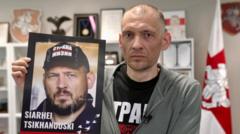Sergei Tikhanovsky has barely spoken for more than five years, a period marked by solitary confinement in a high-security Belarusian prison for opposing a dictatorship. Recently released, the former opposition blogger shared an emotional reunion with his family in Vilnius, revealing how the hardest aspect of imprisonment was the inability to communicate.
"No movement – that wasn't the challenge, it was the silence," he told me, reflecting on his experience behind bars. Released alongside 13 other political prisoners following a visit by a senior U.S. delegation to President Alexander Lukashenko, Sergei experienced a mix of vulnerability and strength after seeing his daughter for the first time since his arrest.
Sergei's physical appearance has drastically changed; once robust and bearded, he now shows signs of losing almost 60kg (132 pounds) during his confinement. Despite these changes, he asserts his spirit is unbroken: "Physically I'm half the size and half the weight," he said, "but my resolve is even stronger now."
In 2020, preliminary to the presidential elections, Sergei gained notoriety with a substantial YouTube following by addressing the people's grievances. His attempts to run against Lukashenko led to his arrest. When his wife, Svetlana Tikhanovskaya, stepped in for him, she drew significant public support and protests that were met with widespread detentions.
Sergei recalls being singled out for harsh treatment and living in conditions that stunt physical and mental health. He spent the majority of the past two years in complete isolation, deprived of communication from family and even basic human contact, including a minister. They warned him, "You will die in prison," as he endured periods of being held in a punishment cell.
The moment Sergei saw a chance for release arrived last August, when hints were made about potential pardons for political detainees. Despite the temptation to abandon his principles for personal freedom, he stood firm. "I am no criminal," he states firmly.
Sergei's release followed intervention from the U.S. involving special envoy Keith Kellogg, which offered Lukashenko a new diplomatic foothold after years of global isolation. In his newfound freedom, Sergei expressed a desperate wish for the release of all political prisoners still incarcerated in Belarus.
His wife, now the opposition leader, is thrilled by his return yet remains cautious, urging for a rigorous stance on sanctions against Lukashenko until systemic repression is fully addressed. Their reunion is bittersweet; while Sergei recovers from his harrowing experience, the struggle for justice and democracy in Belarus continues, with Sergei wholeheartedly committed to this enduring battle.





















